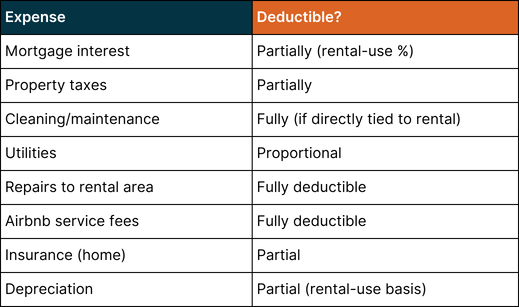
Maximize your earnings with these essential tax tips for Airbnb hosts. Learn about deductible expenses, reporting income, and how to stay compliant this summer.

.png)
As summer travel booms in 2025, many Americans are turning to Airbnb and other platforms to make extra cash. But renting your home—even part-time—can bring unexpected tax consequences. Whether you’re a casual host or managing multiple listings, understanding how the IRS treats your rental income is essential.
At Vincere Tax, we simplify the tax process for short-term rental hosts so you can focus on your guests and profits. Here's everything you need to know to make smart tax moves this season.
Under the IRS 14-Day Rule, if you rent out your home for 14 days or less during the year and use it yourself for more than 14 days, you don’t have to report the rental income at all.
Example: You rent out your lake house for 10 days during a festival and earn $6,000. As long as you personally use the home more than 14 days, that $6,000 is 100% tax-free.
⚠️ But if you rent for 15 days or more, the entire income becomes taxable, including the first 14 days.
If you go beyond 14 days of rental activity, you must report all income on your Schedule E (Form 1040).
Key points:
Tip: Download Airbnb’s transaction summary quarterly to stay organized.
If you rent out part or all of your home, you can deduct a portion of many home-related expenses, based on the rental area and days rented.

Example: Renting a 300 sq ft room (25% of your 1,200 sq ft home) for 120 days means you can deduct 25% of eligible expenses prorated for the time rented.
Learn more from IRS Topic No. 414 – Rental Income and Expenses.
If your Airbnb offers services similar to hotels (daily housekeeping, breakfast, etc.), the IRS may classify your activity as a business rather than a passive rental.
That means:
Example: If you rent your guesthouse with daily breakfast and laundry, you’re likely operating a business under IRS rules.
Check IRS Publication 334 to see where you fall.
Many cities and states require short-term rental hosts to collect and remit hotel or occupancy taxes, which often range from 5% to 15%.
Airbnb collects taxes on your behalf in some areas—but not everywhere. Hosts in cities like:
See Airbnb’s occupancy tax list to learn if taxes are collected for you.
If you rent a portion of your property regularly, you may qualify to deduct depreciation over 27.5 years—a powerful non-cash deduction.
To qualify:
💡 Depreciation reduces taxable income today—but could trigger recapture taxes if you sell the property later. Work with a pro to track it accurately.
You must maintain records beyond Airbnb’s reports. Good tax records should include:
Recommended tools:
The IRS has pushed back the strict $600 reporting threshold, but new rules still apply in 2025.
For this year:
Learn more at IRS 1099-K FAQs.
📝 You must report rental income whether or not you receive a 1099.
If your rental activity earns you significant income, you may be required to make quarterly estimated payments to avoid underpayment penalties.
📅 2025 Estimated Tax Deadlines:
Use IRS Form 1040-ES to calculate what you owe.
Hosting may seem simple, but tax rules get complicated fast when:
📞 Schedule your free tax consultation today — before summer guests turn into year-end stress.
Even experienced hosts can overlook key tax details. Here are some of the most frequent missteps we see at Vincere Tax — and how to avoid them:
Many hosts assume Airbnb automatically manages income taxes or occupancy taxes. While Airbnb may collect local occupancy taxes in some areas, it does not handle your federal or state income tax reporting.
✅ Tip: Always review what Airbnb covers on its Occupancy Tax Help Page, and confirm whether your state requires separate registration.
To deduct expenses correctly, you must know how many days the property was rented vs. used personally. The IRS disallows some deductions if you exceed certain personal use thresholds.
✅ Tip: Keep a detailed log or calendar documenting:
Many hosts leave thousands on the table by not claiming depreciation on their rental property or improvements like flooring, furniture, or appliances.
✅ Tip: Work with a tax pro to calculate depreciation accurately and document all improvements.
You can't deduct all home expenses unless they're proportionally tied to the rental activity. Using your home Wi-Fi for personal use? You can only deduct a portion.
✅ Tip: Separate personal and rental expenses by:
If your Airbnb earnings are significant and taxes aren’t withheld, you could face IRS underpayment penalties.
✅ Tip: If Airbnb is your side hustle or full-time gig, use IRS Form 1040-ES to estimate and pay quarterly taxes. Set calendar reminders for due dates.
Airbnb can be a profitable side hustle or even a full-time gig. But failing to understand your tax obligations could cost you big time. With smart planning and expert guidance, you can stay compliant and save thousands.
Need help? Contact Vincere Tax — we specialize in short-term rental taxes so you don’t have to.

If you rent your property for 14 days or fewer during the year and also use it personally for more than 14 days, the income is completely tax-free under the IRS’s 14-day rule. Rent it for 15 days or more? Then all the rental income becomes taxable, even the first 14 days.
Yes—if you earn over $5,000 on the platform this year. That’s the temporary IRS threshold for 2025 (delayed again from the original $600 rule). However, you're still required to report all rental income, even if you don’t receive a 1099-K or 1099-NEC. In 2026, the $600 rule is expected to take full effect.
You may deduct:
Just remember to allocate based on the square footage and rental use days to separate personal and rental portions accurately.
Usually not. If you’re simply renting space without offering hotel-like services, your income is likely considered passive rental income and reported on Schedule E, which is not subject to self-employment tax.
But if you offer services like meals, daily cleaning, or concierge services, the IRS could reclassify your hosting as a business, requiring you to file Schedule C and pay 15.3% in self-employment tax.
You’ll need to allocate expenses proportionally. For example:
Being audited is comparable to being struck by lightning. You don't want to practice pole vaulting in a thunderstorm just because it's unlikely. Making sure your books are accurate and your taxes are filed on time is one of the best ways to keep your head down during tax season. Check out Vincere's take on tax season!

This post is just for informational purposes and is not meant to be legal, business, or tax advice. Regarding the matters discussed in this post, each individual should consult his or her own attorney, business advisor, or tax advisor. Vincere accepts no responsibility for actions taken in reliance on the information contained in this document.
For business tax planning articles, our tax resources provides valuable insights into how you can reduce your tax liability now, and in the future.